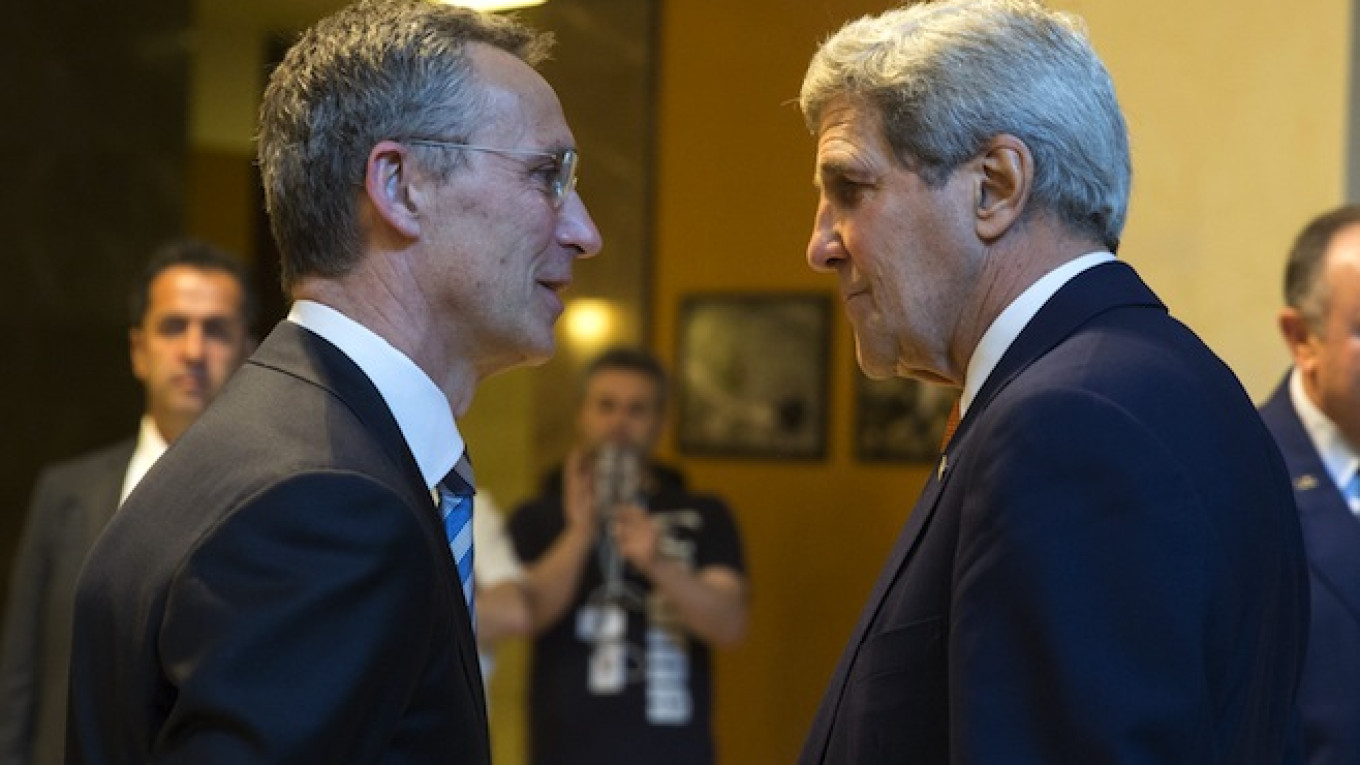ANTALYA, Turkey — U.S. Secretary of State John Kerry called for a halt to fighting around the Ukrainian coastal town of Shyrokyne on Wednesday as NATO backed his demand that Russia fully implement a Ukraine cease-fire agreement.
Despite the February truce, shooting has continued around the coastal town of Shyrokyne, near the strategic port city of Mariupol. Kiev fears separatists may try to seize the port to help cement a long-term hold on eastern districts of Ukraine.
Russia denies providing any troops or arms to support rebellion in eastern Ukraine, which has killed more than 6,100 people, and accuses Kiev of violating the cease-fire.
Kerry flew in to the Turkish seaside resort of Antalya to brief NATO foreign ministers on his eight hours of talks on Tuesday with Russian President Vladimir Putin and Foreign Minister Sergei Lavrov.
Those talks offered no sign of concrete progress to end the crisis over a pro-Russian insurgency in eastern Ukraine that has chilled relations between Russia and the West.
"There was strong agreement among all of the NATO members that this is a critical moment for action by Russia and by the separatists to live up to the Minsk agreement," Kerry said, referring to a cease-fire accord that has been regularly broken.
"And that it is critical to be able to get the OSCE into areas of conflict. It is important to end the conflict in those areas, particularly in Shyrokyne, [they] need to try to come to an agreement on a cease-fire. We need to see the full implementation of Minsk," he told reporters before heading back to Washington to attend a U.S. summit with Gulf states.
NATO Secretary-General Jens Stoltenberg said Monday that Russia had built up forces on the border with Ukraine and sent more military hardware into eastern Ukraine, enabling pro-Russia separatists to launch attacks with little warning if they chose.
While NATO has focused for more than a year on the crisis on its eastern borders in Ukraine, it faces growing security challenges from the south. Islamic State militants occupy parts of Syria and Iraq and have established a foothold in Libya, which has become a key transit point for thousands of migrants trying to reach Europe by sea.
Opening the meeting, Turkish Prime Minister Ahmet Davutoglu said Islamic State posed a direct threat to Turkey's national security and he urged the rest of the world to better coordinate its fight against the militants.
He called for a comprehensive strategy, covering military, political, economic and humanitarian aspects, to tackle the root causes of Islamic State violence.
NATO itself is not heavily involved in the battle against Islamic State although all its 28 members contribute to the U.S.-led coalition fighting the group.
A Message from The Moscow Times:
Dear readers,
We are facing unprecedented challenges. Russia's Prosecutor General's Office has designated The Moscow Times as an "undesirable" organization, criminalizing our work and putting our staff at risk of prosecution. This follows our earlier unjust labeling as a "foreign agent."
These actions are direct attempts to silence independent journalism in Russia. The authorities claim our work "discredits the decisions of the Russian leadership." We see things differently: we strive to provide accurate, unbiased reporting on Russia.
We, the journalists of The Moscow Times, refuse to be silenced. But to continue our work, we need your help.
Your support, no matter how small, makes a world of difference. If you can, please support us monthly starting from just $2. It's quick to set up, and every contribution makes a significant impact.
By supporting The Moscow Times, you're defending open, independent journalism in the face of repression. Thank you for standing with us.
Remind me later.


